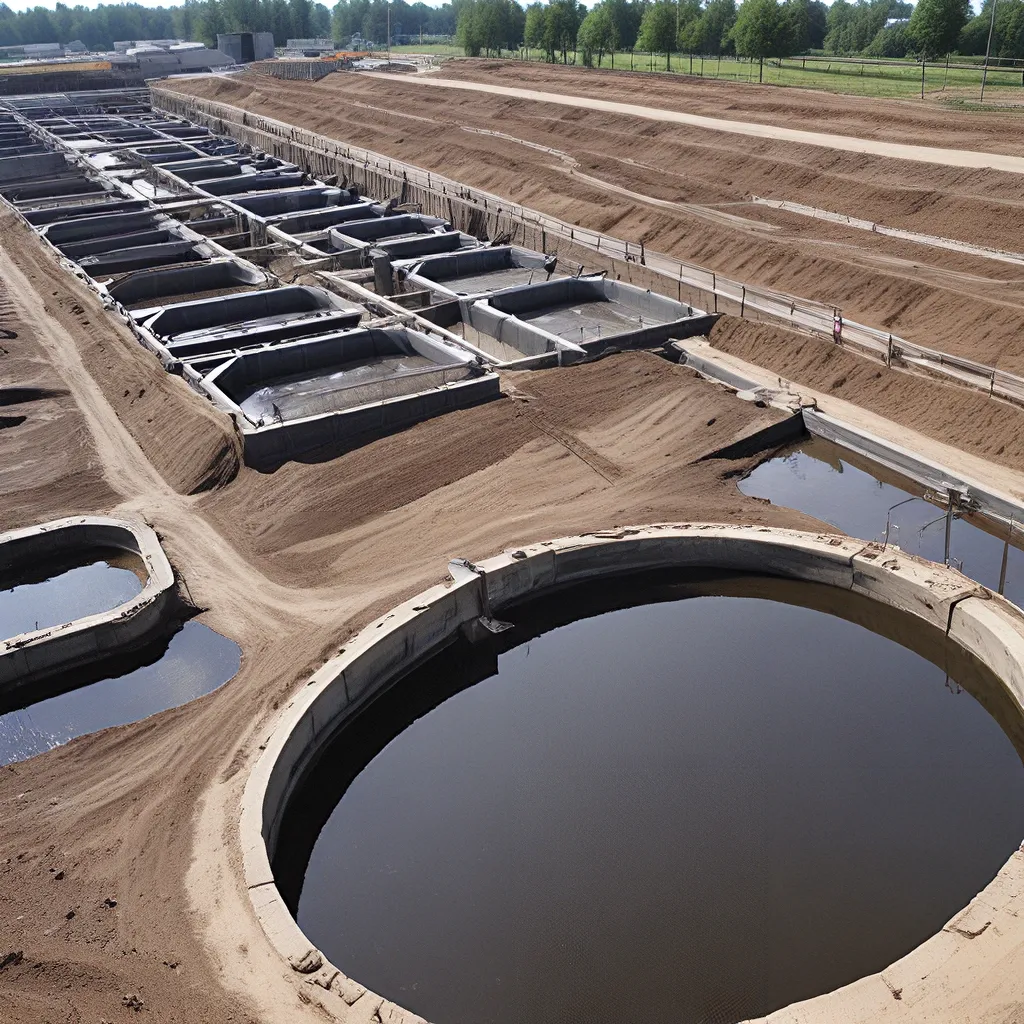
As a professional in the world of wastewater treatment, I’ve seen firsthand how the industry is constantly evolving to meet the growing demands of our modern society. Gone are the days when sludge was simply seen as a nuisance – today, it’s being recognized as a valuable resource that can be transformed into sustainable solutions.
The Sludge Challenge: Turning Waste into Wonder
Let’s start with the basics. Sludge is the semi-solid matter produced from various industrial processes, typically water treatment, wastewater treatment, and sewage treatment. It’s a byproduct that has long been viewed as a hassle, requiring complex and costly disposal methods. But what if I told you that sludge can actually be a treasure trove of untapped potential?
Veolia Water Technologies has been at the forefront of this transformation, supporting public and industry stakeholders in managing biosolids as both an economic and environmental issue. They’ve developed advanced technologies and sustainable solutions for sludge treatment, including products for sludge processing, advanced anaerobic digestion, and biogas plant technology.
The treatment of industrial and domestic wastewater, which produces sludge, is a central issue for public safety and the environment. Effective treatment of sludge provides tangible benefits, ensuring compliance with strict specifications, optimized valuation of remaining sludge, and absolute compliance with environmental standards. Yesterday’s constraints are today’s opportunities, as sludge naturally generated by wastewater treatment plants can be a valuable asset.
Sludge Valorization: Unlocking the Power of Waste
So, how exactly can we transform sludge from a waste product into a valuable resource? Let’s explore some of the innovative sludge valorization techniques that are revolutionizing the industry:
Anaerobic Digestion and Biogas
Anaerobic digestion is a proven process that enables sludge to be converted into a valuable energy source. By breaking down organic matter in the absence of oxygen, this method produces biogas – a mixture of methane and carbon dioxide that can be used to generate electricity or heat. In Germany, for example, sludge-producing wastewater treatment plants often consume the energy they produce, while in France, plants like the one in Cagnes-sur-Mer are able to export the green energy back to the grid. In the UK, sludge is collected from multiple sites and processed in large digesters, with the energy sold on the market.
Thermal Hydrolysis and Co-Digestion
Thermal hydrolysis is another innovative sludge treatment process that helps to enhance the efficiency of anaerobic digestion. By pre-treating the sludge with high temperature and pressure, it breaks down the complex organic matter, making it more accessible for the microorganisms in the digester. This, in turn, increases the biogas yield and the overall energy production.
Additionally, co-digestion – the process of combining sludge with other organic waste streams – can further boost the biogas output. By taking advantage of the complementary nutrient profiles and microbial communities, co-digestion can lead to a more productive and stable digestion process.
Thermal Drying and Energy Recovery
For sludge that is not suitable for agricultural use, thermal drying can be an effective solution. This process reduces the water content of the sludge, transforming it into a dry, energy-dense material that can be used as a fuel in existing energy recovery units. The dried sludge becomes energetically comparable to household waste, making it a viable alternative to traditional disposal methods.
Nutrient and Resource Recovery
Sludge is also increasingly being viewed and treated as a source of valuable by-products and agriculturally beneficial ingredients, such as phosphorus extracted from struvite. Phosphorus is a critical nutrient for plant growth, and its recovery from sludge can help to close the nutrient loop and reduce the need for energy-intensive and environmentally-damaging phosphate mining.
Alpha Wastewater is a company that specializes in providing tailored solutions for sludge management, including the recovery of valuable resources like phosphorus. By working with clients to develop customized strategies, they help to maximize the economic and environmental benefits of sludge valorization.
Embracing the Sludge Transformation
As I’ve highlighted, the traditional view of sludge as a waste product is rapidly changing. Wastewater treatment plants are no longer seen as simply a means of disposal, but rather as hubs for resource recovery and energy production.
Recent research has shown that the valorization of sludge can have a significant impact on the overall sustainability of wastewater treatment systems. By converting sludge into valuable products, we can reduce disposal costs, generate renewable energy, and contribute to the circular economy.
Of course, the journey towards sustainable sludge management is not without its challenges. Replacing a decades-old wastewater treatment plant in a densely populated area, for example, can be a daunting task. But with the right expertise and technology, as demonstrated by Veolia’s work in Lille Métropole, these obstacles can be overcome.
The Future of Sludge: Embracing the Possibilities
As we look to the future, I’m excited to see how the wastewater treatment industry will continue to evolve and unlock the full potential of sludge. Hydro-thermal oxidation, for instance, is a dedicated sludge disposal solution that reduces sludge to its mineral fraction alone without smoke plumes or release of CO2 into the atmosphere.
Ongoing research is also exploring ways to enhance the nutrient recovery capabilities of sludge, potentially revolutionizing the way we approach agricultural fertilization. And who knows what other innovative solutions may emerge as the industry continues to push the boundaries of what’s possible.
One thing is certain: the days of simply treating sludge as a waste product are long gone. As we continue to embrace the power of sludge valorization, I believe we’ll see a future where wastewater treatment plants are transformed into hubs of sustainable energy and resource production. It’s an exciting time to be in this industry, and I can’t wait to see what the future holds.